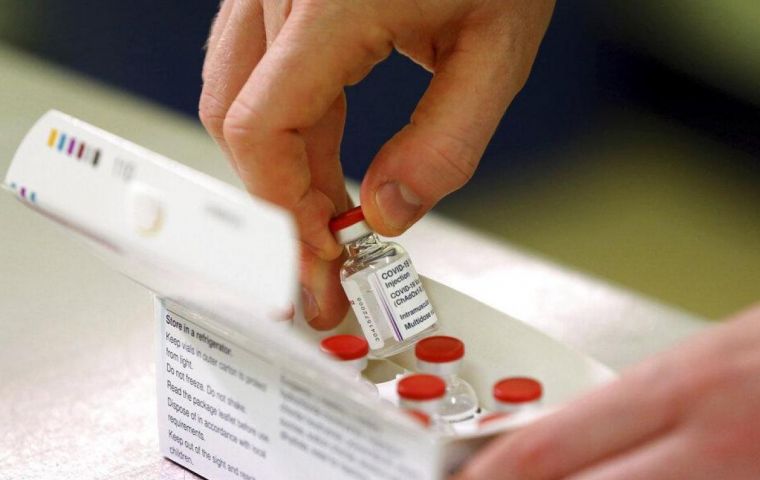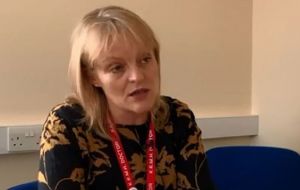MercoPress. South Atlantic News Agency
Falklands has a “plan of attack” to inoculate Islanders with Oxford-AstraZeneca vaccine
 FIG announced it expects to receive 3,000 doses of the vaccine in the first week of February, with a further 2,200 doses supplied before the end of that month. Photo: AP
FIG announced it expects to receive 3,000 doses of the vaccine in the first week of February, with a further 2,200 doses supplied before the end of that month. Photo: AP  “Quarantine is going to remain in place until we have significant herd immunity across our Islands population,” said Dr Edwards.
“Quarantine is going to remain in place until we have significant herd immunity across our Islands population,” said Dr Edwards.Falkland Islands Chief Medical Officer Rebecca Edwards has said there is already a “plan of attack” formulated to vaccinate Islanders with the Oxford-AstraZeneca vaccine for Covid-19.
The Falkland Islands Government announced this week that it expects to receive 3,000 doses of the vaccine in the first week of February, with a further 2,200 doses supplied before the end of that month.
“It needs to be put to the Strategic Pandemic Management Group,” said Dr Edwards at a press conference in Stanley. “But I’m not expecting any hiccups or problems with the approval of how we’re going to roll it out, because we’re following the tried and tested standard approach that pretty much every other country in the world is using, which is starting with those most at risk.”
Dr Edwards said she would be “recommending that we start with our elderly care residents that are currently at Liberty Lodge, and the support staff who look after them, followed by 80 and over, 75 and over, 70 and over, 65 and over. All those who have received a high-risk letter from us will be in our priority group, as will all those who received notification that they were on our moderate risk group … everybody should receive two vaccines. I’m not going to promise that this is exactly what will happen. But it looks very likely that we’ll be able to cover our most at-risk group.”
Under those guidelines, everyone in Camp and at MPC will also be part of the vaccine rollout. “It may be that we ask people in East Falkland to drive to us where they can,” Dr Edwards said, “and we are going to roll out some mobile teams to visit the Islands and the West Falkland settlements to vaccinate the people who fall into our priority group.”
While it’s hoped that everyone will eventually receive two vaccine doses, it’s currently not known when more supplies will be available, so the focus will be on higher-risk individuals. These people will receive a card listing which vaccine they’ve had and which arm they had it in, along with the date and batch number.
UK hiccups
Dr Edwards also said lessons had been learned from the teething problems the UK is experiencing with its vaccine distribution.
“I think it’s important we don’t try and bite off more than we can chew. By that I mean it’s important that we vaccinate efficiently and effectively as many people as possible, rather than giving one dose to lots of people when we don’t know when we’re going to be getting more supplies of the vaccine. So our plan is to make sure we can fully cover, so we get the best response for the most people that we can by delivering two doses rather than going for the approach where we give everybody one dose.
“Because if we don’t receive a second dose within 12 weeks the first dose become null and void. And we have no guarantee that we’re going to receive any more vaccine within 12 weeks. We might do, but we have no guarantee that we will.”
There were soothing words for anyone worried they might not be able to take the vaccine because they are allergic to flu vaccinations. “There are very few people that can’t actually have the AstraZeneca vaccine. It’s very safe with very few side effects.
There may be one or two people who cannot receive the vaccine but they will be very few. Just because you cannot receive the flu vaccine it doesn’t automatically mean you cannot receive the AstraZeneca vaccine because they vaccine. So our plan is to make sure we can fully cover, so we get the best response for the most people that we can by delivering two doses rather than going for the approach where we give everybody one dose.
Quarantine to remain
“Because if we don’t receive a second dose within 12 weeks the first dose becomes null and void. And we have no guarantee that we’re going to receive any more vaccine within 12 weeks. We might do, but we have no guarantee that we will.”
There were soothing words for anyone worried they might not be able to take the vaccine because they are allergic to flu vaccinations. “There are very few people that can’t actually have the AstraZeneca vaccine. It’s very safe with very few side effects.
There may be one or two people who cannot receive the vaccine but they will be very few. Just because you cannot receive the flu vaccine it doesn’t automatically mean you cannot receive the AstraZeneca vaccine because they are very different vaccines made up of different components.”
However, even when you have your vaccine documentation, quarantine requirements for those visiting or returning to the Islands will not be loosened.
“Quarantine is going to remain in place until we have significant herd immunity across our Islands population,” said Dr Edwards.
“Even then it will be scaled back in steps rather than switched off altogether. As we’ve said all along, vaccination is not an off switch, vaccination doesn’t mean that life returns to normal. Vaccination does mean that if you are unfortunate enough to catch Covid you are less likely to become significantly unwell.
“We don’t know yet how long your immunological response lasts, people haven’t been receiving the vaccine long enough for the science to have been gathered around this topic. We also don’t know how it effects transmissibility of the disease, so although it might not affect you badly once you’ve been vaccinated, you might still be able to transmit the disease to others who have not been vaccinated. So no, it absolutely doesn’t mean you will be exempt from quarantine.”
Barry Rowland, Chief Executive of FIG, emphasized that point. “It is a very important step, but as far as quarantine measures are concerned we’re actually likely to tighten them rather than loosen them, given the situation that we’re seeing in the UK, to strengthen our position further”.




Top Comments
Disclaimer & comment rules
Read all commentsCommenting for this story is now closed.
If you have a Facebook account, become a fan and comment on our Facebook Page!